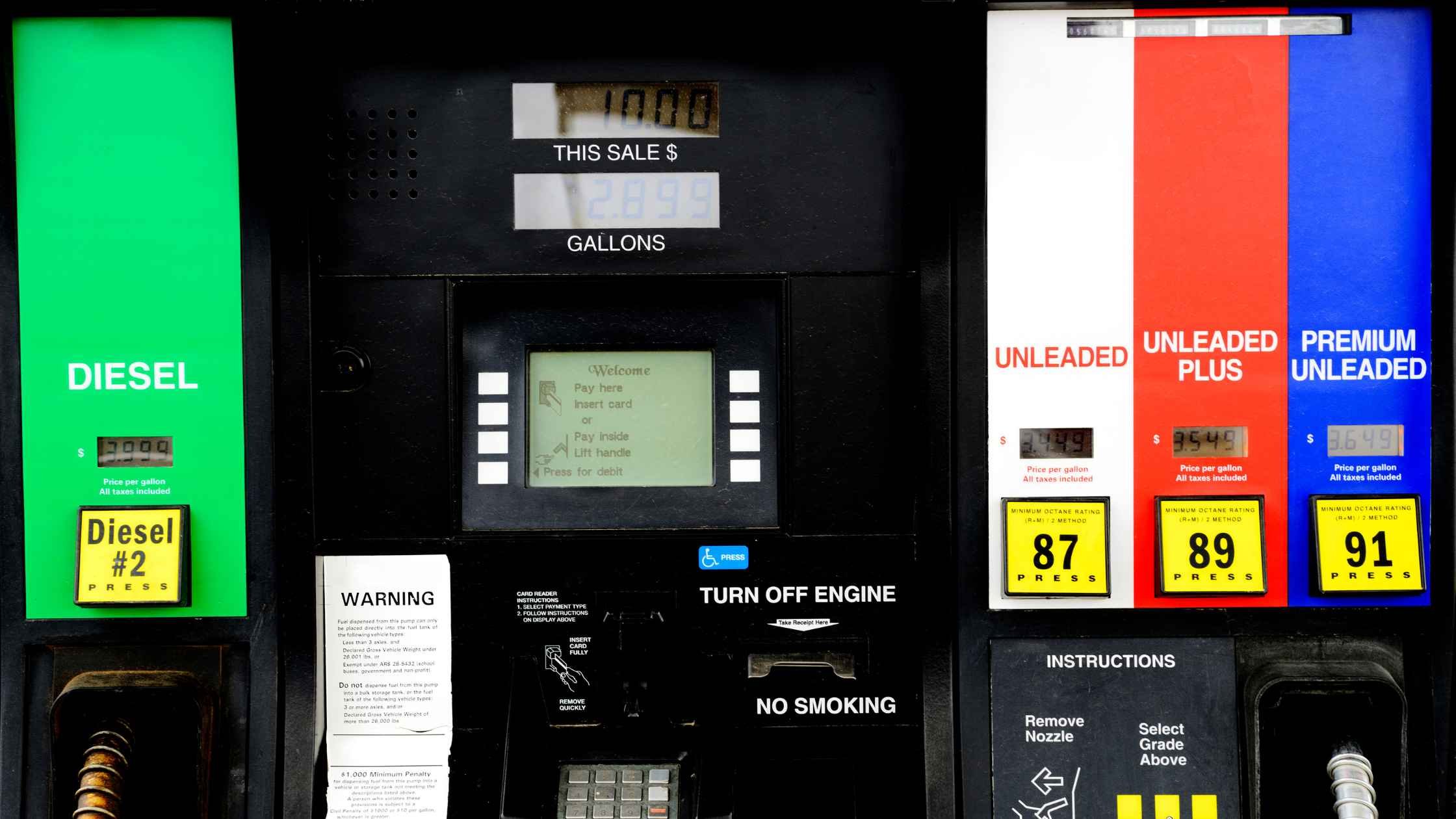
What's the difference between diesel and gas? What similarities do these fuel types share, and is diesel the same as gasoline? Diesel is a slower-burning fuel type that holds more power than regular gasoline and is typically used in bigger machines or vehicles that require more energy at a lower RPM. Meanwhile, regular gasoline burns quicker and is used in lighter vehicles for more horsepower. The type of fuel your vehicle uses depends on the purpose for which the vehicle was designed. Let's go over some diesel vs. gas differences and why certain vehicles use one fuel type or the other.
Table of Contents
- What is gas, and is diesel considered gasoline?
- How is diesel different from gas?
- What's the difference between diesel and gas engines?
- Why is diesel more efficient than gas?
- Is diesel the same as gasoline in terms of engine durability?
- Is there a difference between diesel and gas vehicle costs?
- Which type of vehicle should you choose?
What is gas, and is diesel considered gasoline?
Regular gasoline, often referred to as "regular unleaded," is a type of fuel used in internal combustion engines of vehicles. It is created from refining crude oil and is the lowest octane fuel offered at gas stations. Regular gasoline is characterized by its ability to ignite easily and burn quickly, making it ideal for use in passenger vehicles. When a vehicle's engine is started, the gasoline is drawn into the engine's cylinders where it is mixed with air. This mixture is then compressed and ignited by a spark plug, creating a small explosion. This small explosion triggers the pistons which power the vehicle's crankshaft and ultimately drive the wheels. Regular unleaded gasoline is created by a global infrastructure of extraction, refining, and distribution, making it common among drivers around the world.
How is diesel different from gas?
Is diesel considered gasoline? While they can often do the same job, they aren't technically the same product. Both are derived from crude oil, but diesel and gas differences are created from their unique refining processes. Diesel fuel also has a higher density level and is less volatile compared to regular gasoline which means that it burns more slowly. Diesel plays a huge role in the global economy because of its use in powering larger engines that perform heavy-duty jobs. Diesel engines are used in critical industries like transportation, agriculture, and construction, to name just a few. It is often used in international shipping and logistics since it powers large vehicles like trucks, buses, and trains as well as heavy machinery such as tractors, cranes, and generators. This makes diesel-powered vehicles an indispensable tool for the movement of goods and services globally.
What's the difference between diesel and gas engines?
Since diesel engines have a unique combustion process, they have a high compression ratio compared to gasoline engines. This high compression is needed for diesel combustion, as it heats the air in the cylinder to a temperature that ignites the diesel during compression ignition. Unlike gasoline engines, diesel engines do not require spark plugs for ignition. Their components, including the engine block, pistons, and cylinder heads, are built to withstand the high pressures and stresses needed to operate. Diesel engines often have advanced fuel injection systems that control the timing and amount of fuel injected into the combustion chamber. This system is needed to improve engine performance, fuel efficiency, and emissions.
On the other hand, gasoline engines are designed around the spark-ignition process. Unlike diesel engines, they operate at lower compression ratios, which is needed to compress the air-fuel mixture but not enough to ignite it spontaneously. The central feature of a gasoline engine is the spark plug, which provides the necessary spark to ignite the compressed air-fuel mixture within each cylinder. This design requires a more complex ignition system, including components like the distributor, ignition coils, and spark plugs. The internal design of a gasoline engine is also lighter than that of a diesel engine since it doesn't need to withstand the high compression ratios of diesel combustion. This allows the engine's ability to produce more horsepower and faster acceleration. Additionally, gasoline engines often incorporate complex fuel injection systems, either port injection or direct injection, which control the delivery of fuel to improve performance, fuel efficiency, and emissions.
Why is diesel more efficient than gas?
First, why is diesel more efficient than gas? Diesel engines are notably more fuel-efficient compared to gasoline engines because of their higher energy density. This means that it contains more energy per unit volume. Diesel engines operate using a compression ignition system which provides a more efficient combustion process. This creates a greater mileage per gallon of fuel, making diesel engines particularly beneficial for heavy-duty or long-distance driving. Lastly, diesel engines tend to operate more efficiently at lower RPMs and under various load conditions. This makes them useful for a wider range of jobs that require travel over long distances.
Regular gasoline engines generally have lower fuel efficiency than diesel engines. This is because of the lower energy density of gasoline and the spark ignition system used in these engines which leads to less efficient fuel combustion. Gasoline engines tend to lose more energy in the form of heat, especially through exhaust and cooling systems. However, gasoline engines are more capable of achieving higher RPMs and offer quicker acceleration compared to diesel engines. This makes them more favorable where speed and rapid power delivery are needed. Gasoline engines usually have a lower thermal efficiency compared to diesel engines, which is a result of their lower compression ratios. This makes gasoline engines less suited for jobs where fuel economy is a primary concern, such as in commercial transportation or heavy machinery operations.
Is diesel the same as gasoline in terms of engine durability?
The difference between diesel and gas is also noticeable in engine durability. Diesel engines are known for their exceptional durability and longevity because of their robust construction and operational efficiency. They're made to withstand the high compression needed for diesel combustion and have stronger components such as engine blocks, pistons, and cylinder heads. This allows them to endure more operational stress over longer periods. Diesel engines also operate at lower RPM, reducing the wear and tear on moving parts, which helps in improving their lifespan. The combustion process and higher energy density of diesel fuel lead to less strain on the engine which helps extend its service life. These factors make diesel engines particularly durable for heavy-duty jobs where reliability and endurance are needed.
Regular gasoline engines generally have less durability and do not match the lifespan of diesel engines. They are designed for higher RPMs and operate at higher temperatures which causes wear and tear on engine components over time. The spark ignition system in gasoline engines has more moving parts like spark plugs and distributors, that are prone to regular wear and tear. Gasoline engines also have more complex emission control systems which can require more regular maintenance.
Is there a difference between diesel and gas vehicle costs?
The upfront costs for diesel engines are generally more expensive than gasoline engines. This higher initial cost is due to the more robust construction required to handle the high compression ratios of diesel combustion. However, diesel engines typically offer better fuel efficiency thanks to their higher energy density and efficient combustion process. This can lead to savings on fuel costs over time, especially for drivers who cover long distances or haul heavy loads. Maintenance costs for diesel engines can also be higher because of their components like high-pressure fuel injection systems. Despite the higher initial costs for diesel engines, these engines usually have longer lifespans and can handle higher mileage before requiring major repairs. And while diesel fuel generally costs more than regular gasoline, trucking fuel cards can help businesses save money on diesel fuel.
Gasoline engines are usually cheaper to buy and maintain which makes them more accessible for many buyers. They generally require less expensive routine maintenance since the parts and labor for repairs are usually more affordable and available. However, gasoline engines are less fuel-efficient than diesel engines, leading to higher fuel expenses over time, especially with frequent use or in jobs demanding high performance. Additionally, gasoline engines often have a shorter lifespan compared to diesel engines, which can impact their long-term value and lead to earlier replacement costs. While advancements in technology have improved the durability and efficiency of gasoline engines, their overall cost of ownership can still be higher when considering fuel and potential replacement expenses over the engine's lifetime.
Which type of vehicle should you choose?
Choosing between a diesel and a regular gasoline engine depends on several factors including your specific needs, the nature of the work, and long-term cost considerations. If your job involves hauling heavy loads or equipment, a diesel vehicle is the right choice, and you'll want to look into diesel fuel cards for truckers to purchase diesel fuel. Diesel engines are known for their durability, torque, and fuel efficiency, especially under high-load or extended use. On the other hand, if your work requires lighter loads, less intensive tasks, or basic commuting, a gasoline vehicle is likely the better option.
Conclusion
Now that you know what is the difference between diesel fuel and gasoline, you can determine which type of vehicle and engine is the better fit for your priorities. Those who work in transportation, construction, or agriculture might want to choose a vehicle with a durable diesel engine. Drivers who move lighter loads or just need daily transportation should opt for a vehicle with a gas engine. Additionally, diesel engines, while more fuel-efficient, often have higher upfront costs and maintenance expenses, but their longer lifespan could offset these costs over time. If you need to purchase diesel for your fleet, then you’ll want to evaluate the benefits of different fuel cards for truckers. Meanwhile, gasoline engines are generally cheaper upfront and less expensive to maintain, though they might be less fuel-efficient and have a shorter lifespan. Overall, knowing how is diesel different from gas will guide you in choosing a suitable vehicle and engine type for your job requirements.





